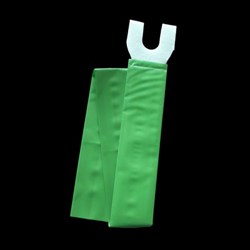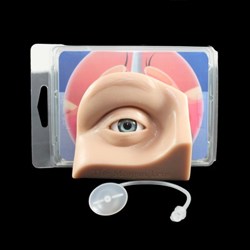MT202
Part Number: MT202
The Morgan Lens Delivery Set makes using the Morgan Lens even easier by allowing the simultaneous irrigation of both eyes. Instead of wasting valuable time and money on separate IV setups, the Morgan Lens Delivery Set may be attached to one or two Morgan Lenses. Within seconds, relief is on its way to your patient, allowing the assessment and treatment of other injuries while ocular therapy is underway.
Ocular injuries are often bilateral, but the pain in one eye may mask the pain in the other, or nerve damage may have created an analgesic effect (especially with alkali burns). Unless the second eye is completely pain-free and no pathology is discovered, immediate irrigation should be started in both eyes.
The following equipment is recommended for bilateral eye irrigation using the Morgan Lens:
Two Morgan Lenses (part number MT2000-USA or MT6673-Outside-USA)–one per eye
Topical ocular anesthetic (if available)
One Morgan Lens Delivery Set (part number MT202)
One bag of irrigating solution (MorTan recommends lactated Ringer’s or Hartmann’s Solution)
Two Medi-Ducts (part number MT63)-one per eye–or towels, blue pads, or another fluid collection device
This video is approximately five minutes long and gives instructions for the use of the Morgan Lens, including showing the insertion and removal and describing the recommended uses.
This fact sheet contains information on buffer solutions, how they work, and why they are better for eye irrigation.
This PowerPoint Presentation covers uses and instructions for using the Morgan Lens. Speaker notes are included in the downloaded version. Click the button below to download.

The Medi-Duct
An ocular fluid management system designed to make irrigation with the Morgan Lens even more convenient.

Training Tool
The Morgan Lens Training Tool allows "hands-on" practice on how to use the Morgan Lens for emergency ocular irrigation.

Our products are 100% American-made—crafted and sourced right here in the USA!
”
-Once I had an exposure while give a patient a medication through a saline lock. The syringe backed out slightly and when I gave the med a little push it sprayed into my eyes. It burned, so I immediately flushed my eyes. A co-worker instilled a Morgan lens to each eye and ran sterile N.S. and I felt immediate relief.
-A local trauma surgeon and avid woodworker complained of irritation to his eye for several days. The eye was obviously irritated. After being examined by an emergency department doctor for a foreign body, and finding none, we irrigated the eye using the Morgan Lens. The surgeon found the lens to be comfortable, and after irrigation the eye felt better. Two days later his eye was better without redness or irritation.
-An employee of the hospital where I work had a car battery explode in his face. An eye irrigation was set up and initiated with the Morgan Lens. He felt much better and commented on the soothing feeling of the sterile saline irrigation.
Registered Nurse (California)
The Morgan Lens is used in 90% of hospital emergency departments in the USA and can be inserted in less than 20 seconds. There simply is no other "hands-free" method of eye irrigation. Nothing else frees medical personnel to treat other injuries or to transport the patient while irrigation is underway. Nothing is more effective at treating ocular chemical, thermal, and actinic burns or removing non-embedded foreign bodies, even when the patient's eyes are closed tightly. Its design makes it simple and straightforward to use so minimal training is required.